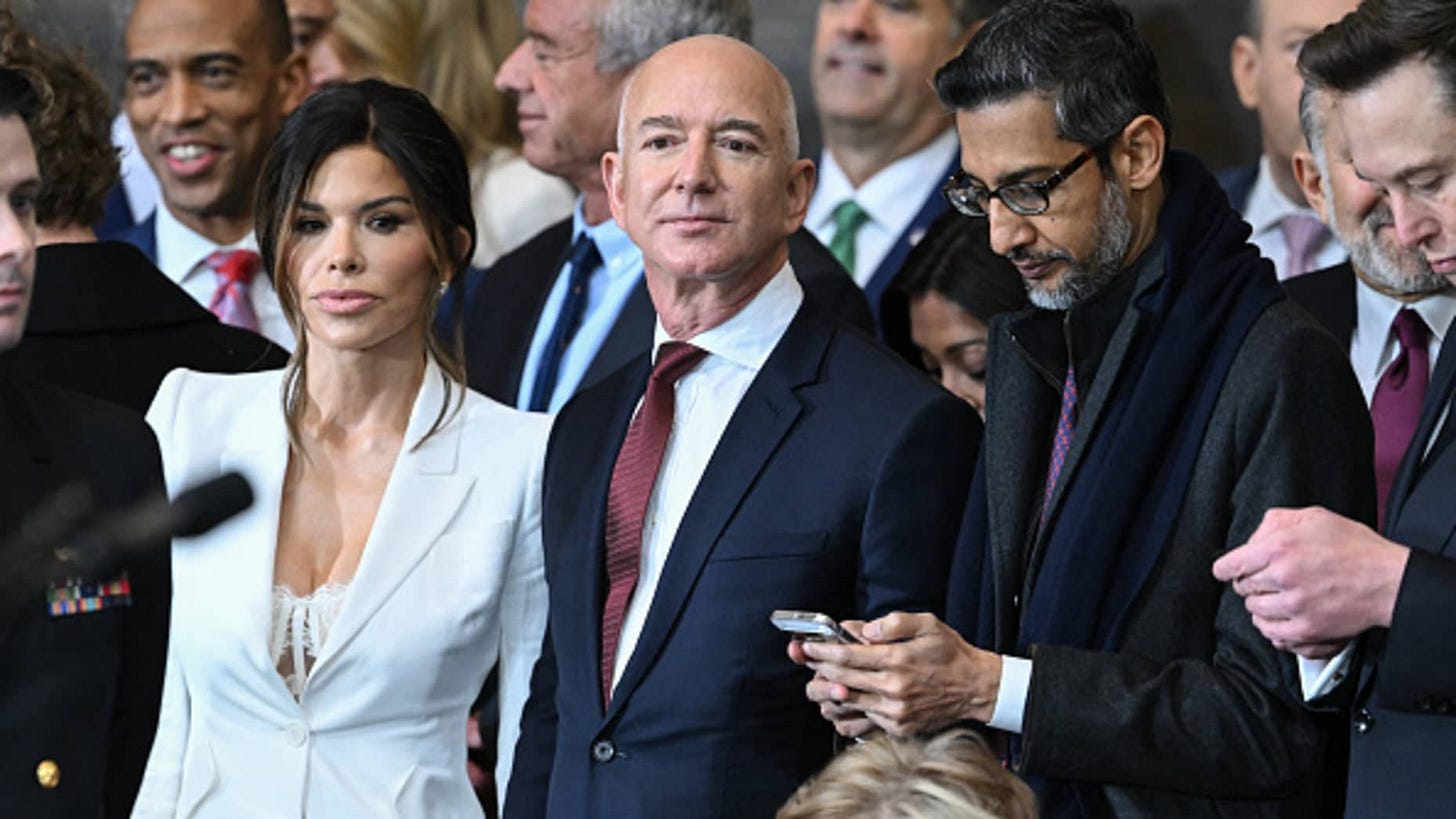Terrorist's Bomb Kills Texas Rancher on His Own Farm, US Puts $5M Price Tag on Citizenship, UK Demands Apple Let Them Spy on...The Whole World (The Five for 02/26/25)
Hey, welcome to The Five, a publication about the stories that matter, but don’t always make the front page.
Let’s dive into the news.
[one]
An Afghanistan-War-level murder happened in Texas yesterday.
CBS Corpus Christie reports:
the Texas Agriculture Commissioner is calling it a "tragic and alarming incident" near the border south of Brownsville, after a U.S. citizen and Texas rancher was killed by an improvised explosive device.
One of the victims in the explosion earlier this month was Antonio Céspedes Saldierna, 74, a rancher from Brownsville.
He was driving his truck on his ranch in San Fernando, Tamaulipas, when he triggered the device.
Horacio Lopez Peña and his wife Ninfa Griselda Ortega were also in the vehicle when the device exploded. Peña was killed and Ortega was hospitalized.
The U.S. Consulate in Mexico issued a travel advisory last month warning people of gun violence and improvised explosives on the South Texas border.
"This shocking act of violence highlights the growing threat posed by cartel activity along our southern border," said Sid Miller. "I urge all Texas farmers, ranchers, and agricultural workers who travel to Mexico or operate near the border to exercise extreme caution. The Lower Rio Grande Valley (LRGV) is a crucial part of Texas agriculture, and the safety of our agricultural community is of utmost importance. We cannot overlook the rising violence that threatens not only lives but also the security of our farms, ranches, and rural communities."
Dating back to Obama, there’s been a call in the White House to designate drug cartels as terrorist organizations…not sure what more evidence is needed on that front.
[two]
President Donald Trump announced a new path to U.S. citizenship: a pricey gold card.
The U.S. is going to “sell” gold cards for $5 million, Trump announced in the Oval Office Tuesday.
“We're going to be putting a price on that card of about $5 million and that's going to give you [permanent resident] Green Card privileges, plus it's going to be a route to citizenship,” the president said. He branded it as “somewhat like a Green Card, but at a higher level of sophistication.”
“Wealthy people will be coming into our country by buying this card,” he continued. “They'll be wealthy and they'll be successful and they'll be spending a lot of money and paying a lot of taxes and employing a lot of people. And we think it's going to be extremely successful and never been done before.”
Secretary of Commerce Howard Lutnick clarified the Trump administration plans to terminate a somewhat similar EB-5 Immigrant Investor Program and “replace it with the Trump gold card.”
The EB-5 program allows investors to apply for permanent residence in the U.S. if they “make the necessary investment in a commercial enterprise in the United States” and plan to create or preserve 10 permanent full-time jobs.
The EB-5 program was “full of nonsense, make-believe and fraud,” Lutnick continued. “It was a way to get a green card that was low priced.”
Once vetted, gold card holders “can invest in America and we can use that money to reduce our deficit,” he added.
The president predicted that the gold card will bring in “very high level people” who create jobs. With these cards, “you're getting big taxpayers, big job producers, and we'll be able to sell maybe a million of these cards, maybe more than that,” Trump said.
The pay-for-citizenship model is popular in the Carribean, with St. Kitts and Nevis, Antigua and Barbuda, Dominica, Grenada and St. Lucia all offering dual-citizenship for investments ranging from $100K to $250K.
[three]
Once deemed the most important paper in the U.S., the Washington Post has been bleeding subscribers (and credibility, and profitability) for years. In trying to politically rebalance the opinion section, and owner Jeff Bezos seems to be pretty comfortable with a sizeable loss of left-of-center subcribers.
Jeff Bezos, the Amazon founder and owner of the Washington Post, said Wednesday that his newspaper’s opinion pages would now be dedicated to supporting “personal liberties and free markets,” and that the organization would not publish opposing views.
“We’ll cover other topics too of course,” Bezos said in an email to Post staffers that he posted on X. “But viewpoints opposing those pillars will be left to be published by others.”
Bezos said that editorial page editor David Shipley, who had held the job for over two years, decided to resign rather than lead the opinion section under the new policy.
“I suggested to him that if the answer wasn’t ‘hell yes,’ then it had to be ‘no,’” Bezos said of Shipley, adding, “I respect his decision.”
The Post will be “searching for a new Opinion Editor to own this new direction,” Bezos said.
He asserted that while a major newspaper might once have considered it a service to offer its readers “a broad-based opinion section that sought to cover all views,” that is no longer the case.
“Today, the internet does that job,” Bezos wrote.
“I’m confident that free markets and personal liberties are right for America,” he added. “I also believe these viewpoints are underserved in the current market of ideas and news opinion. I’m excited for us together to fill that void.”
It’s a noteworthy move…but the bigger question is what role opinions in a newspaper can play in a world of continually “breaking” news on Twitter and YouTube…
Some of the WaPo staff took to Twitter to…secure severance packages, I assume.
[four]
President Trump and Ukraine have struck a deal to recoupe some of the billions send to the Russia/Ukraine war…via mining rights within Ukraine.
Ukraine and the U.S. have reached an agreement on a framework for a broad economic deal that would include access to Ukraine’s rare earth minerals, three senior Ukrainian officials said Tuesday.
The officials, who were familiar with the matter, spoke on condition of anonymity because they were not authorized to speak publicly. One of them said that Kyiv hopes that signing the agreement will ensure the continued flow of U.S. military support that Ukraine urgently needs.
The agreement could be signed as early as Friday and plans are being drawn up for Ukrainian President Volodymyr Zelenskyy to travel to Washington to meet President Donald Trump, according to one of the Ukrainian officials.
Another official said the agreement would provide an opportunity for Zelenskyy and Trump to discuss continued military aid to Ukraine, which is why Kyiv is eager to finalize the deal.
Trump, speaking to reporters in the Oval Office, said he’d heard that Zelenskyy was coming and added that “it’s okay with me, if he’d like to, and he would like to sign it together with me.”
Trump called it a big deal that could be worth a trillion dollars. “It could be whatever, but it’s rare earths and other things.”
[five]
And finally, The U.K. demanded that Apple let them spy on…every iphone user on the planet.
No, that’s not hyperbole.
From Foreign Policy:
Last month, the U.K. government demanded that Apple weaken the security of iCloud for users worldwide. On Friday, Apple took steps to comply for users in the United Kingdom. But the British law is written in a way that requires Apple to give its government access to anyone, anywhere in the world. If the government demands Apple weaken its security worldwide, it would increase everyone’s cyber-risk in an already dangerous world.
If you’re an iCloud user, you have the option of turning on something called “advanced data protection,” or ADP. In that mode, a majority of your data is end-to-end encrypted. This means that no one, not even anyone at Apple, can read that data.It’s a restriction enforced by mathematics—cryptography—and not policy. Even if someone successfully hacks iCloud, they can’t read ADP-protected data.
Using a controversial power in its 2016 Investigatory Powers Act, the U.K. government wants Apple to re-engineer iCloud to add a “back door” to ADP. This is so that if, sometime in the future, U.K. police wanted Apple to eavesdrop on a user, it could. Rather than add such a back door, Apple disabled ADP in the U.K. market.
Should the U.K. government persist in its demands, the ramifications will be profound in two ways. First, Apple can’t limit this capability to the U.K. government, or even only to governments whose politics it agrees with. If Apple is able to turn over users’ data in response to government demand, every other country will expect the same compliance. China, for example, will likely demand that Apple out dissidents. Apple, already dependent on China for both sales and manufacturing, won’t be able to refuse.
Dropping the security feature would not just give the UK gov a backdoor into their own citizens’ phones…but ALL mobile devices manufactured by Apple.
Thank God they stood up against that.
Until the next one,
-sth








